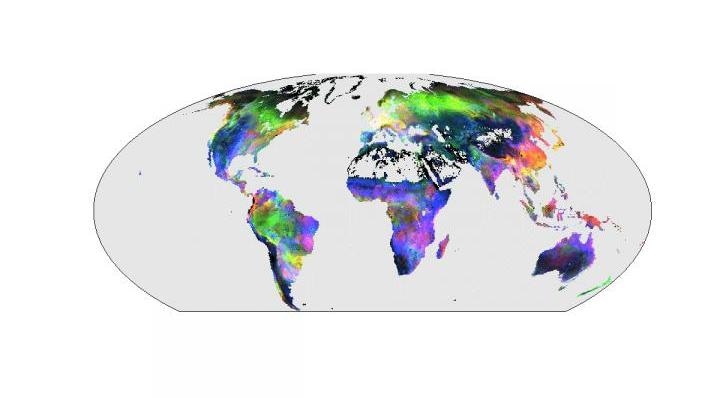Feb 15 2019
A study by German researchers from Jena and Hamburg, published recently in the journal Nature, reveals that artificial intelligence (AI) can considerably advance man’s insight into climate and the Earth system. Particularly, the potential for deep learning has only partly been exhausted thus far. Specifically, multifaceted dynamic processes such as hurricanes, vegetation dynamics, and fire propagation can be better defined with the aid of AI. Consequently, climate and Earth system models can be enhanced, with new models integrating AI and physical modeling.
 Climate-driven CO2 exchange: The spectral colors show the anomalies in the CO2 exchange on land during El Niño years. FLUXNET data have been upscaled by machine learning. Radiation anomalies are shown in red, temperature anomalies in green and water anomalies in blue. (Image credit: © Martin Jung)
Climate-driven CO2 exchange: The spectral colors show the anomalies in the CO2 exchange on land during El Niño years. FLUXNET data have been upscaled by machine learning. Radiation anomalies are shown in red, temperature anomalies in green and water anomalies in blue. (Image credit: © Martin Jung)
In the past several years, mostly static attributes have been examined using machine learning methods, such as the dispersal of soil properties from the local to a worldwide scale. For quite a while now, it has been possible to handle more dynamic processes by using more advanced deep learning methods. This enables, for instance, to quantify the universal photosynthesis on land with concurrent consideration of seasonal and short term differences.
Deducing underlying laws from observation data
"From a plethora of sensors, a deluge of Earth system data has become available, but so far we've been lagging behind in analysis and interpretation", explains Markus Reichstein, managing director of the Max Planck Institute for Biogeochemistry in Jena, directory board member of the Michael-Stifel-Center Jena (MSCJ) and first author of the publication. "This is where deep learning techniques become a promising tool, beyond the classical machine learning applications such as image recognition, natural language processing or AlphaGo", adds co-author Joachim Denzler from the Computer Vision Group of the Friedrich Schiller University Jena (FSU) and member of MSCJ. Examples for application are dangerous events such as hurricanes or fire spreads, which are highly complex processes affected by local conditions but also by their spatial and temporal context. This also applies to ocean and atmospheric transport, vegetation dynamics, and soil movement, some of the typical themes of Earth system science.
Artificial intelligence to improve climate and Earth system models
However, deep learning methods are challenging. All data-driven and statistical methods do not assure physical consistency as such, are very dependent on data quality, and may undergo problems with extrapolations. Moreover, the necessity for data processing and storage capacity is truly high. The publication deliberates all these necessities and problems and develops an approach to efficiently integrate machine learning with physical modeling. If both methods are combined, so-called hybrid models are formed. They can, for instance, be used for modeling the motion of ocean water to forecast sea surface temperature. While the temperatures are modeled physically, the ocean water movement is denoted by a machine learning method. "The idea is to combine the best of two worlds, the consistency of physical models with the versatility of machine learning, to obtain greatly improved models", Markus Reichstein further explains.
The researchers believe that detection and early warning of extreme events, as well as seasonal and long-term forecast and projection of climate and weather, will greatly profit from the discussed deep-learning and hybrid modeling methods.